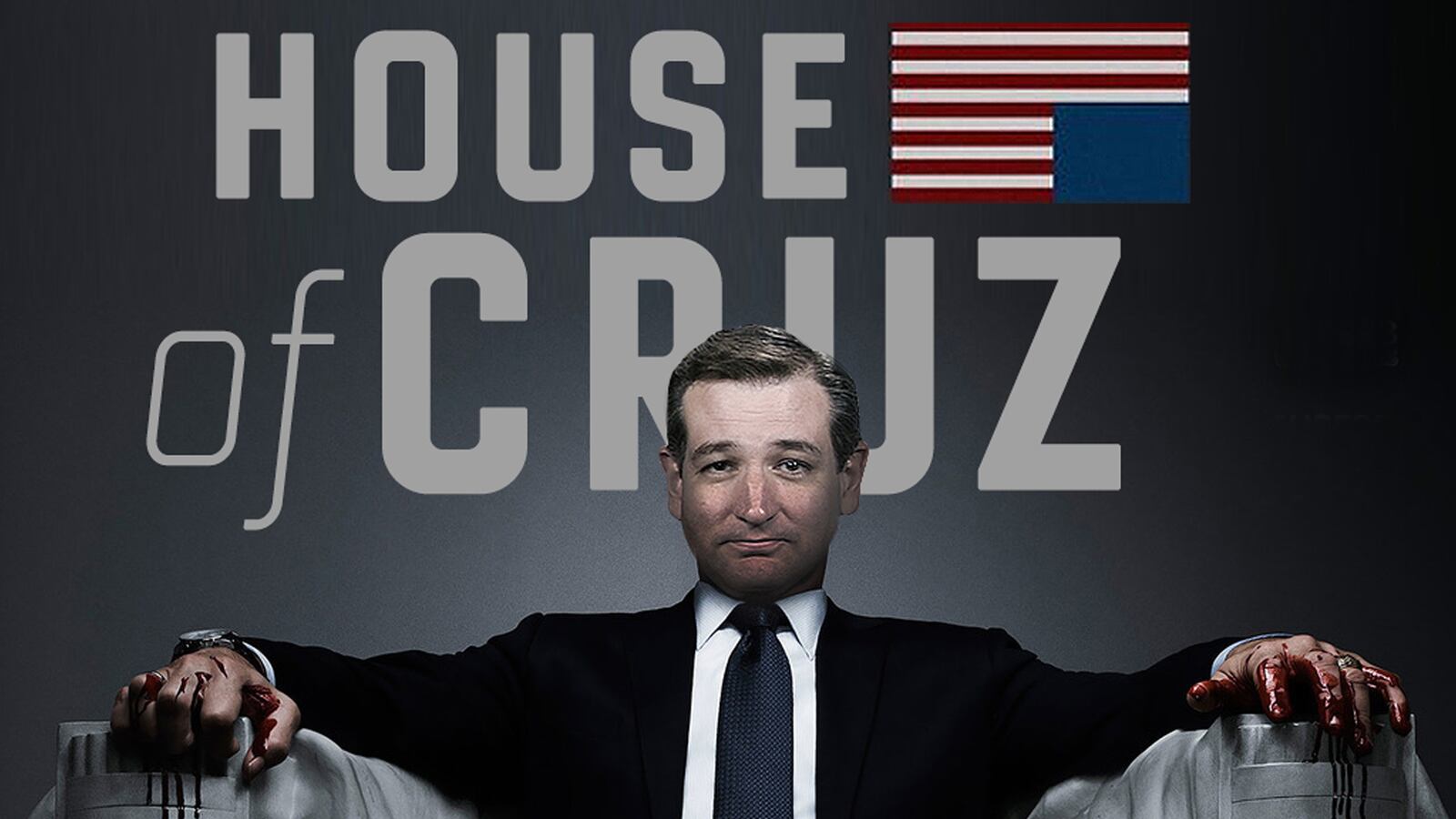For anyone who’d been wondering where Sen. Ted Cruz gets that trash-talking mouth of his, the video of his dad that surfaced this week should pretty much lay the question to rest.

As a special Halloween treat, Mother Jones posted a speech that Rafael Cruz gave during his son’s Senate race last year. In it, Papa Cruz rants and raves about the “crisis” this country is facing because of its “Marxist” president. Perhaps unsurprisingly, the failed-businessman-turned-preacher goes on at length about how Obama and the rest of the Democratic heathen are trying to drive God from the public square. And once he really gets rolling, Rafael urges the assembled patriots to send our dangerous president “back to Kenya.”
Clearly Ted learned his bare-knuckles, crazy-ass demagoguery at the knee of a master.
Indeed, for anyone looking to understand the reckless, uncompromising, burn-the-village-to-the-ground side of Ted Cruz, the most obvious place to start is his ex-Cuban-revolutionary daddy. But for all his Tea Party street cred, Cruz does not qualify as any of the “antis” often associated with the movement: anti-elitist, anti-establishment, anti-intellectual… He is, in many ways, the consummate insider: well heeled, well connected, and absurdly well credentialed. (Princeton, Harvard, and a Supreme Court clerkship? Come on!)
For a window into this more buttoned-down side of the strange political hybrid that is Cruz, the place to look is toward his equally—if not more—formidable wife, Heidi.
In many ways, Heidi Cruz Nelson, age 41 and the mother of two young daughters, is precisely the sort of hard-charging woman to make feminists’ mouths water: smart, driven, credentialed (Harvard Business School, JP Morgan, Bush 2000, the Bush Treasury Department , Goldman Sachs…), and unapologetic about her ambition. She is passionately conservative, no doubt. But those who know her say she lacks some of her hubby’s more noxious qualities, like his big mouth, his combativeness, and his “all about me” narcissism. “It’s never been just about Heidi,” says P. Edward Haley, one of Heidi’s professors at Claremont McKenna College with whom she established a lasting friendship. “Despite our political differences,” he adds.
Of course, Heidi herself has expressed political views that seem to ring with irony coming from the wife of the Senate’s most flamboyant obstructionist. In 2009, she sat down for a wide-ranging video interview as part of her alma mater’s President’s Leader’s Forum. This was right around the time that Ted, then in private legal practice, was flirting with an ultimately abandoned run for Attorney General of Texas. Asked if she thought there was a place for idealism in politics, she erupted:
“Absolutely! I think it’s the base of it. It’s fundamental. We have to maintain that. Look at the founders of our country: They were idealistic. They created a system that has stood the test of time. The only thing I caution is that we can’t be so idealistic that we get nothing done. There is an argument that you need to continue to advance the ball and try to work with different parties and interests to move things forward.”
Heidi also talked at length about how she and her brother had been raised to help the less fortunate and shared some of the charity work she has been involved in over the years, including the trip she and Ted took to help drill water wells in Nicaragua. “It’s ingrained in our family that life is about giving back,” she explained.
The daughter of 7th Day Adventist missionaries, Heidi Nelson was raised with the expectation that she would do well. “I think it was her dad who had very high standards for her,” says Haley. “It was a tough love kind of thing.”
Young Heidi did not disappoint. After graduating Phi Beta Kappa from Claremont, she accepted a Rotary scholarship that sent her to study in Strasbourg, France, where she traveled the continent and “developed a passion for West Europe.” (To go with her Harvard MBA, Heidi also has a Masters in European Business from the Solvay School in Brussels.) The focus of her studies was the emerging markets of Eastern Europe. As Heidi explained in her Claremont interview, her parents’ missionary work exposed her at an early age to the grinding poverty of many nations—something that “made an impression” on her and got her interested in emerging markets. When it came time to get a job, however, Heidi was “quite keen” to start out in New York because that where the action was. “As a woman, I wanted to have an opportunity set that was as broad as possible,” she recalled. When JP Morgan offered her a spot in its Wall Street office, she jumped at it without sweating too much about the details. “When I arrived I said, ‘I’d like to work on Eastern Europe,’” she continued. “They said, ‘Well, Eastern Europe is not done out of New York. It’s done out of London.’” When she learned that Latin America was the only emerging market handled out of New York, said Heidi, “I figured out how to learn Spanish. You adjust your skill set for what’s close to your interests.”
From the campaign, Heidi moved on to help with the Florida recount and then into a variety of posts with the Bush administration: an economic director on the National Security Council, a special assistant to the U.S. Trade Rep, and a director in the Treasury Department, where she wound up running the Latin America office. Along the way, she picked up countless important professional contacts—and one husband. The two met on the Bush campaign, where Ted toiled in the domestic policy shop. As the love story goes, the two had their first date on January 5th and were married that May. (“It was a sweet affair with Teds’ friends looking oh-so nerdy and conservative,” recalls Haley.) Like Heidi, Ted went on to work in the administration, making them one of those classic striving political couples that swarm around the Beltway.
But when Ted returned to Texas in 2003 to serve as state Solicitor General, the couple faced the usual problems of what Haley calls “a traveling marriage.” Haley still recalls the day in the spring of 2004 when Heidi announced that she was heading back to Texas and back into the private sector. “She and Ted came to brunch in our apartment in DC” where Haley and his wife Elaine were then living. “She said, ‘I’m going back with Ted. He wants to get into elective politics in Texas.’”
Of course, it took another eight years for Ted to achieve his goal. And there is no question that Heidi played a key role in making that happen. For starters, her executive position at Goldman Sachs means Ted has not needed to fret about the family’s financial well-being. (Or its health insurance, as many have pointed out in recent days.) More narrowly, while Ted pulled in his fair share of campaign cash from the GOP’s Tea Party wing, his wife’s colleagues stepped up as well. (The $65,000 from Goldman’s PAC and employees constituted Cruz’s second-largest source of funding.) Without Heidi’s shared passion for politics, there’s no way she would have agreed to let Ted sink their entire savings into his campaign, much less put up with the inevitable and endless disruption to the family’s life. Then, of course, there’s all the time and effort she put into the campaign herself. “She was very involved on all sides,” says Haley, “strategy, money-raising, all of that.”
With her husband’s new celebrity, Heidi finds herself at the nexus of both private and public sector success. Though, amusingly, not necessarily at the juncture that she would most prefer. In the course of her must-see Claremont interview, Heidi was asked her views about the different branches of government. While nodding to the important role Congress has to play, she admitted to “personally prefer[ring] the executive branch” with its “power to push things through.” Unlike Congress, with its competing power centers and interests, she noted, “in the White House you are the elected party. And your power to move things in a direction is formidable.”
Are you listening, Ted?






